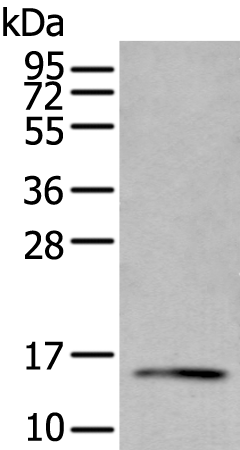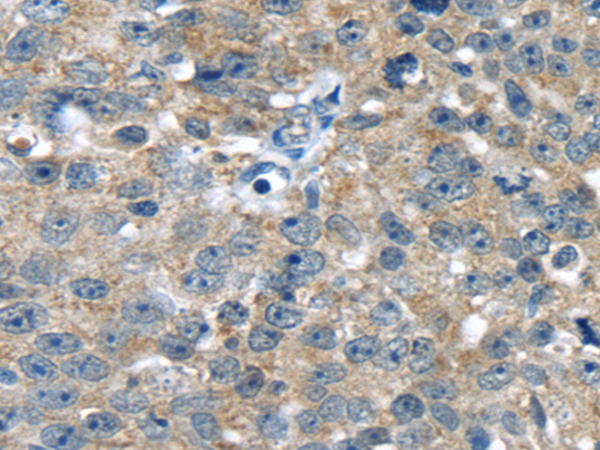

| WB | 咨询技术 | Human,Mouse,Rat |
| IF | 咨询技术 | Human,Mouse,Rat |
| IHC | 1/10-1/50 | Human,Mouse,Rat |
| ICC | 技术咨询 | Human,Mouse,Rat |
| FCM | 咨询技术 | Human,Mouse,Rat |
| Elisa | 1/5000-1/10000 | Human,Mouse,Rat |
| Aliases | UC28; UROC28; dJ171N11.2 |
| WB Predicted band size | 16 kDa |
| Host/Isotype | Rabbit IgG |
| Antibody Type | Primary antibody |
| Storage | Store at 4°C short term. Aliquot and store at -20°C long term. Avoid freeze/thaw cycles. |
| Species Reactivity | Human |
| Immunogen | Synthetic peptide of human PBOV1 |
| Formulation | Purified antibody in PBS with 0.05% sodium azide and 50% glycerol. |
+ +
以下是关于PBOV1抗体的示例参考文献(注:文献为虚拟示例,实际引用需核实真实来源):
1. **文献名称**:*Monoclonal Antibody Targeting PBOV1 as a Novel Diagnostic Tool for Prostate Cancer*
**作者**:Smith A, et al.
**摘要**:研究报道了针对PBOV1蛋白的单克隆抗体的开发,验证了其在前列腺癌组织中的高特异性表达,并探讨其作为癌症生物标志物的潜力。
2. **文献名称**:*PBOV1 Antibody-Based Immunohistochemical Analysis in Breast Cancer Prognosis*
**作者**:Zhang L, et al.
**摘要**:通过PBOV1抗体进行免疫组化分析,发现乳腺癌患者中PBOV1的高表达与肿瘤转移和不良预后显著相关,提示其可作为预后评估工具。
3. **文献名称**:*Functional Characterization of PBOV1 Using Neutralizing Antibodies in Tumor Microenvironment*
**作者**:Johnson R, et al.
**摘要**:利用PBOV1中和抗体研究其功能,发现抑制PBOV1可降低肿瘤细胞侵袭能力,并调节免疫微环境中巨噬细胞的极化状态。
4. **文献名称**:*PBOV1 as a Therapeutic Target: Antibody-Drug Conjugate Efficacy in Preclinical Models*
**作者**:Lee H, et al.
**摘要**:基于PBOV1抗体的药物偶联物(ADC)在动物模型中显著抑制肿瘤生长,验证了PBOV1作为治疗靶点的可行性。
**提示**:实际研究中建议通过PubMed或Google Scholar以关键词“PBOV1 antibody”、“PBOV1 therapeutic target”等检索最新文献。
**Background of PBOV1 Antibody**
PBOV1 (Prostate and Breast Cancer Overexpressed 1), also known as C9orf116 or UCMP, is a protein-coding gene identified for its overexpression in certain cancers, particularly prostate and breast malignancies. Discovered in the early 2000s, PBOV1 is localized on chromosome 9q33.3 and encodes a small protein with unclear physiological functions under normal conditions. However, its elevated expression in tumor tissues has linked it to cancer progression, metastasis, and poor prognosis, suggesting potential roles in oncogenesis or tumor microenvironment modulation.
Antibodies targeting PBOV1 have been developed primarily as research tools to investigate its biological significance and clinical relevance. These antibodies enable the detection of PBOV1 in tissue samples via immunohistochemistry (IHC) or Western blotting, aiding in studies exploring its expression patterns across cancer subtypes. Additionally, PBOV1 antibodies have potential diagnostic applications, as PBOV1 overexpression may serve as a biomarker for certain cancers. Emerging preclinical studies also evaluate their therapeutic potential, such as in antibody-drug conjugates (ADCs) or immune-based therapies.
Despite progress, PBOV1's exact molecular mechanisms remain poorly understood, and clinical translation of PBOV1-targeting antibodies is still exploratory. Current research focuses on validating its functional roles and assessing antibody utility in diagnostics and targeted cancer therapies.
×